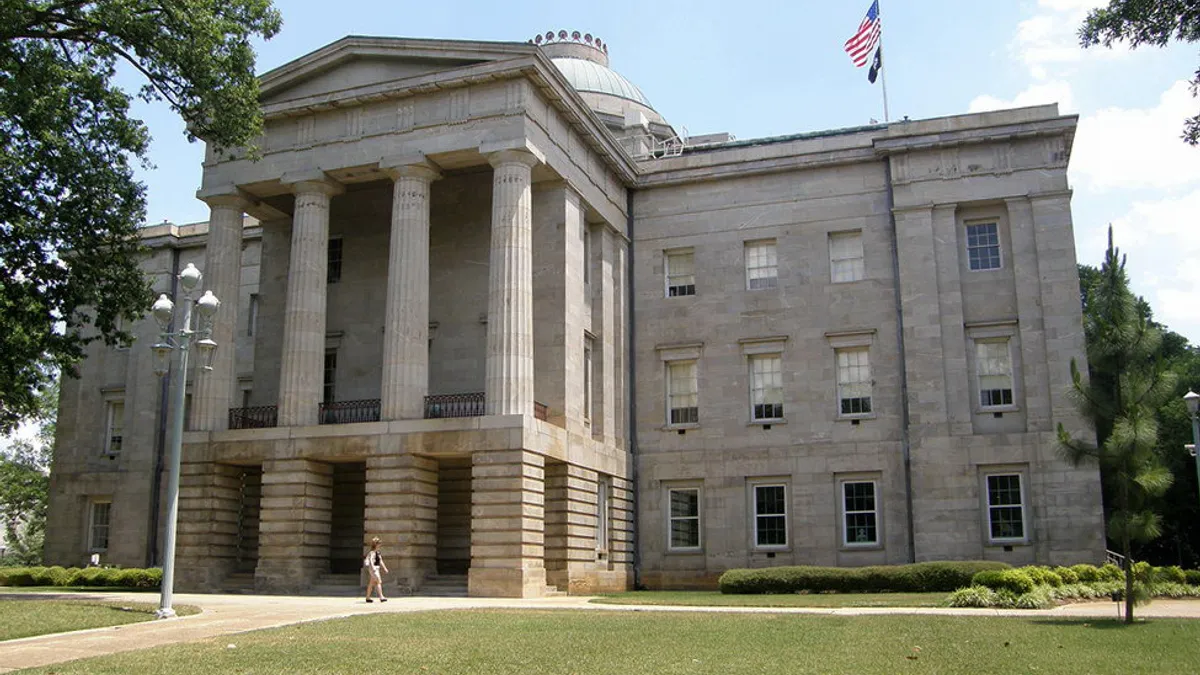Dive Brief:
- North Carolina lawmakers voted Friday to allow themselves to select all members of the state's community college system governing board, stripping appointment power from the governor.
- The change, included as part of the state's budget, also takes away the governor's ability to appoint members to local community college boards. And it removes the lieutenant governor, the state treasurer and the labor commissioner as ex officio members on the system’s board.
- North Carolina's Senate and House currently selects four trustees for the system’s board, and the governor chooses 10. Once the budget is enacted in October, the General Assembly will control the board's membership, excluding the nonvoting student representative.
Dive Insight:
Many state leaders choose members of their public higher education governing boards, and it's expected that appointees share their political ideologies.
But North Carolina's community college board will be a rarity, as panels are traditionally a mix of gubernatorial and legislative selections. The state's other higher education system, the University of North Carolina System, already has a board whose voting members are chosen entirely by legislators.
On Friday, Gov. Cooper said the state's budget prioritizes power grabs and expects many of its provisions to face legal action. He said he would not sign the bill, a symbolic act, as the budget would become law automatically after ten days passed without his signature.
Republican Senate Leader Phil Berger dismissed Cooper's plan as "political cowardice."
"It’s clear that virtue signaling and political ambition drive his decisions,” Berger said.
Earlier this year, state lawmakers also weighed a bill seeking to rework how the Legislature chose members of the UNC System’s governing board. The proposal would have shifted most of the appointment power from state lawmakers to just the leaders of the House and Senate, positions held by Republicans for over a decade.
While the bill passed the Legislature, Cooper vetoed it in August, saying it "violates the separation of powers enshrined in the state Constitution." The bill would have also changed the appointment procedures of other state groups, including the public health commission and the transportation board.
"Legislative efforts to seize executive power are unconstitutional and damage vital state work," he wrote at the time.
The bill is back in the Senate, where lawmakers will likely override the veto. Republicans hold a supermajority in the Legislature, defanging Democratic Gov. Roy Cooper's veto power.
Even without that proposal, Republicans have primarily appointed conservatives to the UNC system board. The American Association of University Professors, a prominent faculty group, accused the board of interference in academic affairs.
North Carolina is one of a handful of states facing accusations of political interference in academic affairs.
Utah Gov. Spencer Cox, a Republican, replaced every member on his state's board of higher education earlier this year. Florida Gov. Ron DeSantis' ability to appoint trustees allowed him to flood the New College of Florida’s board with political allies and remake the institutions in his conservative vision for the state's higher education.














